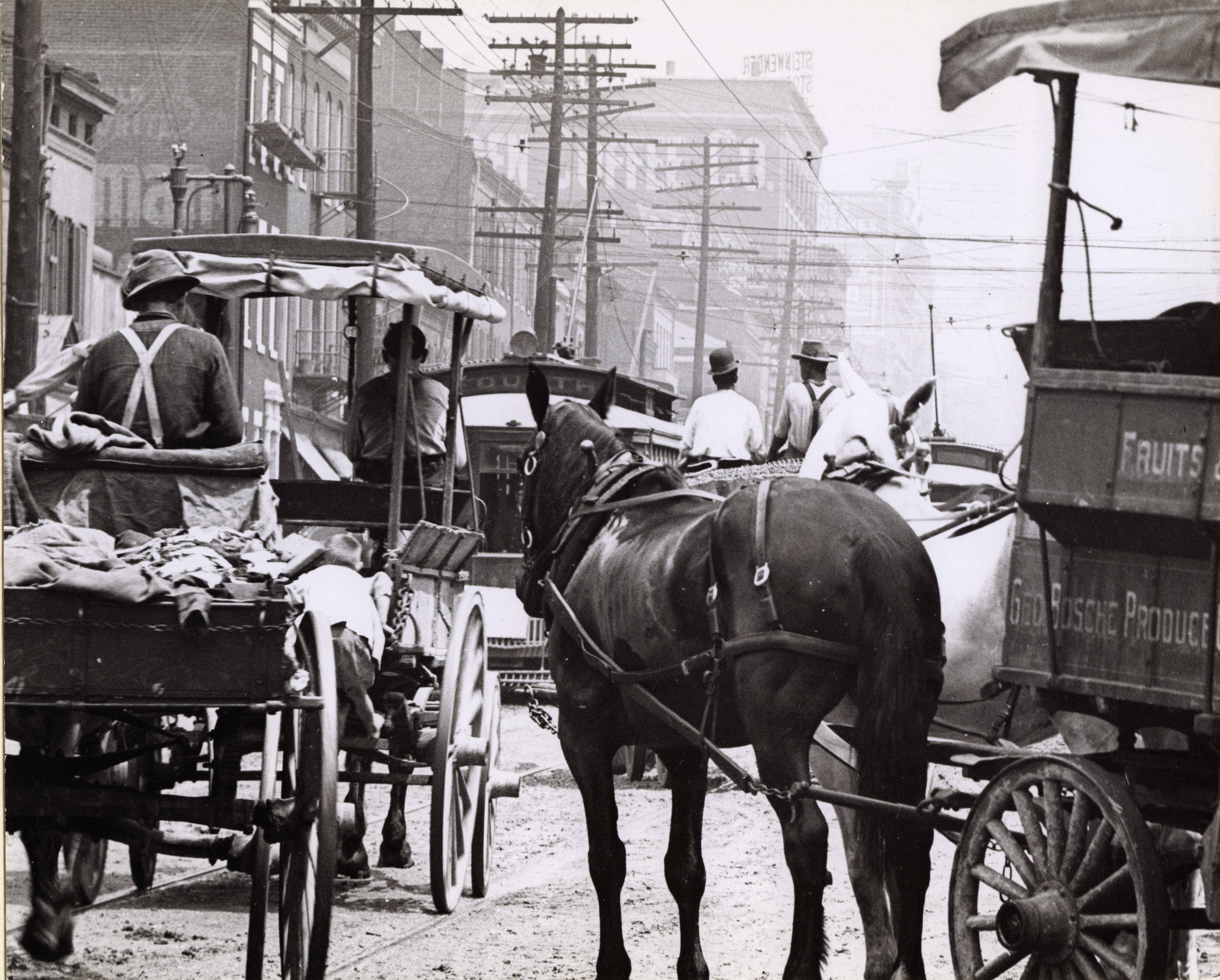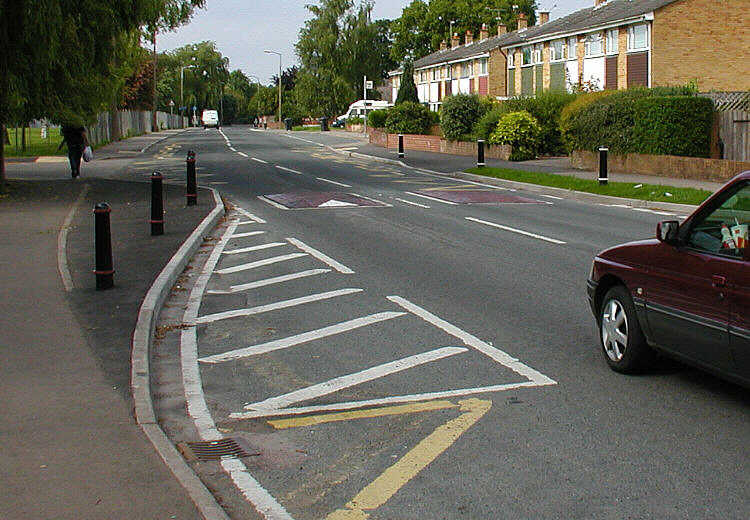|
Crosswalk
A pedestrian crossing (or crosswalk in American English) is a place designated for pedestrians to cross a road, street or avenue. The term "pedestrian crossing" is also used in the Vienna and Geneva Conventions, both of which pertain to road signs and road traffic. Marked pedestrian crossings are often found at intersections, but may also be at other points on busy roads that would otherwise be too unsafe to cross without assistance due to vehicle numbers, speed or road widths. They are also commonly installed where large numbers of pedestrians are attempting to cross (such as in shopping areas) or where vulnerable road users (such as school children) regularly cross. Rules govern usage of the pedestrian crossings to ensure safety; for example, in some areas, the pedestrian must be more than halfway across the crosswalk before the driver proceeds. Signalised pedestrian crossings clearly separate when each type of traffic (pedestrians or road vehicles) can use the crossing. U ... [...More Info...] [...Related Items...] OR: [Wikipedia] [Google] [Baidu] |
Zebra Crossing
A zebra crossing (British English) or a marked crosswalk (American English) is a pedestrian crossing marked with white stripes (zebra markings). Normally, pedestrians are afforded precedence over vehicular traffic, although the significance of the markings may vary by jurisdiction. They are known as "zebra" crossings as the stripes resemble the coat of a zebra. The first zebra crossing was installed in Slough, United Kingdom in 1951 to enhance pedestrian safety at new and already existing crossing points. Since then, zebra markings have been used at crossing points internationally to denote pedestrian crossings. Many have been replaced by various types of signalled crossing due to safety concerns. Terminology and usage of the markings varies by country. In the UK and other Commonwealth countries, they are usually called zebra crossings, as the stripes resemble the striped coat of a zebra. In the UK, zebra markings are only found at unsignalised, standalone zebra crossings and m ... [...More Info...] [...Related Items...] OR: [Wikipedia] [Google] [Baidu] |
Traffic
Traffic comprises pedestrians, vehicles, ridden or herded animals, trains, and other conveyances that use public ways (roads) for travel and transportation. Traffic laws govern and regulate traffic, while rules of the road include traffic laws and informal rules that may have developed over time to facilitate the orderly and timely flow of traffic. Organized traffic generally has well-established priorities, lanes, right-of-way, and traffic control at intersections. Traffic is formally organized in many jurisdictions, with marked lanes, junctions, intersections, interchanges, traffic signals, or signs. Traffic is often classified by type: heavy motor vehicle (e.g., car, truck), other vehicle (e.g., moped, bicycle), and pedestrian. Different classes may share speed limits and easement, or may be segregated. Some jurisdictions may have very detailed and complex rules of the road while others rely more on drivers' common sense and willingness to cooperate. Orga ... [...More Info...] [...Related Items...] OR: [Wikipedia] [Google] [Baidu] |
Traffic Calming
Traffic calming uses physical design and other measures to improve safety for motorists, pedestrians and cyclists. It has become a tool to combat speeding and other unsafe behaviours of drivers in the neighbourhoods. It aims to encourage safer, more responsible driving and potentially reduce traffic flow. Urban planners and traffic engineers have many strategies for traffic calming, including narrowed roads and speed humps. Such measures are common in Australia and Europe (especially Northern Europe), but less so in North America. Traffic calming is a calque (literal translation) of the German word ''Verkehrsberuhigung'' – the term's first published use in English was in 1985 by Carmen Hass-Klau. History In its early development in the UK in the 1930s, traffic calming was based on the idea that residential areas should be protected from through-traffic. Subsequently, it became valued for its ability to improve pedestrian safety and reduce noise and air pollution from t ... [...More Info...] [...Related Items...] OR: [Wikipedia] [Google] [Baidu] |
Cycleway Assen G11
Cycling infrastructure is all infrastructure cyclists are allowed to use. Bikeways include bike paths, bike lanes, cycle tracks, rail trails and, where permitted, sidewalks. Roads used by motorists are also cycling infrastructure, except where cyclists are barred such as many freeways/motorways. It includes amenities such as bike racks for parking, shelters, service centers and specialized traffic signs and signals. The more cycling infrastructure, the more people get about by bicycle. Good road design, road maintenance and traffic management can make cycling safer and more useful. Settlements with a dense network of interconnected streets tend to be places for getting around by bike. Their cycling networks can give people direct, fast, easy and convenient routes. History The history of cycling infrastructure starts from shortly after the bike boom of the 1880s when the first short stretches of dedicated bicycle infrastructure were built, through to the rise of t ... [...More Info...] [...Related Items...] OR: [Wikipedia] [Google] [Baidu] |
HAWK Beacon
A HAWK beacon (High-Intensity Activated crossWalK beacon) is a traffic control device used to stop road traffic and allow pedestrians to cross safely. It is officially known as a pedestrian hybrid beacon. The purpose of a HAWK beacon is to allow protected pedestrian crossings, stopping vehicular traffic only as needed. The HAWK beacon is a type of traffic control alternative to traffic control signals and/or where an intersection does not meet traffic signal warrants. A HAWK beacon is used only for marked crosswalks. A similar hybrid beacon, called "emergency-vehicle hybrid beacons" are allowed at driveways of emergency service buildings such as fire stations. History The first beacon was developed in Tucson, Arizona by Transportation Administrator R. B. Nassi, and installed in 2000. After being inspired by a trip to Bristol where he saw a pelican crossing, he developed a prototype and his wife suggested the abbreviation HAWK. Prior to its full implementation, the HAWK beacon w ... [...More Info...] [...Related Items...] OR: [Wikipedia] [Google] [Baidu] |
Pelican Crossing On Cuffley Hill (geograph 2443957)
Pelicans (genus ''Pelecanus'') are a genus of large water birds that make up the family Pelecanidae. They are characterized by a long beak and a large throat pouch used for catching prey and draining water from the scooped-up contents before swallowing. They have predominantly pale plumage, except for the brown and Peruvian pelicans. The bills, pouches, and bare facial skin of all pelicans become brightly coloured before the breeding season. The eight living pelican species have a patchy global distribution, ranging latitudinally from the tropics to the temperate zone, though they are absent from interior South America and from polar regions and the open ocean. Long thought to be related to frigatebirds, cormorants, tropicbirds, and gannets and boobies, pelicans instead are now known to be most closely related to the shoebill and hamerkop, and are placed in the order Pelecaniformes. Ibises, spoonbills, herons, and bitterns have been classified in the same order. Fossil evid ... [...More Info...] [...Related Items...] OR: [Wikipedia] [Google] [Baidu] |
Zebra
Zebras (, ) (subgenus ''Hippotigris'') are African equines with distinctive black-and-white striped coats. There are three living species: the Grévy's zebra (''Equus grevyi''), plains zebra (''E. quagga''), and the mountain zebra (''E. zebra''). Zebras share the genus ''Equus'' with horses and asses, the three groups being the only living members of the family Equidae. Zebra stripes come in different patterns, unique to each individual. Several theories have been proposed for the function of these stripes, with most evidence supporting them as a deterrent for biting flies. Zebras inhabit eastern and southern Africa and can be found in a variety of habitats such as savannahs, grasslands, woodlands, shrublands, and mountainous areas. Zebras are primarily grazers and can subsist on lower-quality vegetation. They are preyed on mainly by lions, and typically flee when threatened but also bite and kick. Zebra species differ in social behaviour, with plains and mountain zebra ... [...More Info...] [...Related Items...] OR: [Wikipedia] [Google] [Baidu] |
Side Road Zebra In Conway Street, St Helier
Side or Sides may refer to: Geometry * Edge (geometry) of a polygon (two-dimensional shape) * Face (geometry) of a polyhedron (three-dimensional shape) Places * Side (Ainis), a town of Ainis, ancient Thessaly, Greece * Side (Caria), a town of ancient Caria, Anatolia * Side (Laconia), a town of ancient Laconia, Greece * Side (Pontus), a town of ancient Pontus, Anatolia * Side, Turkey, a city in Turkey * Side, Iran, a village in Iran * Side, Gloucestershire, or Syde, a village in England Music * Side (recording), the A-side or B-side of a record * The Side, a Scottish rock band * ''Sides'' (album), a 1979 album by Anthony Phillips * ''Sides'', a 2020 album by Emily King * "Side" (song), a 2001 song by Travis * "Sides", a song by Flobots from the album '' The Circle in the Square'', 2012 * "Sides", a song by Allday from the album ''Speeding'', 2017 Teams * Side (cue sports technique) * Side, a team, in particular: ** Sports team Other uses * Side (mythology), one of three m ... [...More Info...] [...Related Items...] OR: [Wikipedia] [Google] [Baidu] |
Cyclists Crossing Refuge Crossing Onehunga
Cycling, also, when on a two-wheeled bicycle, called bicycling or biking, is the use of cycles for transport, recreation, exercise or sport. People engaged in cycling are referred to as "cyclists", "bicyclists", or "bikers". Apart from two-wheeled bicycles, "cycling" also includes the riding of unicycles, tricycles, quadricycles, recumbent and similar human-powered vehicles (HPVs). Bicycles were introduced in the 19th century and now number approximately one billion worldwide. They are the principal means of transportation in many parts of the world, especially in densely populated European cities. Cycling is widely regarded as an effective and efficient mode of transportation optimal for short to moderate distances. Bicycles provide numerous possible benefits in comparison with motor vehicles, including the sustained physical exercise involved in cycling, easier parking, increased maneuverability, and access to roads, bike paths and rural trails. Cycling also offers a ... [...More Info...] [...Related Items...] OR: [Wikipedia] [Google] [Baidu] |
The Times
''The Times'' is a British daily national newspaper based in London. It began in 1785 under the title ''The Daily Universal Register'', adopting its current name on 1 January 1788. ''The Times'' and its sister paper '' The Sunday Times'' (founded in 1821) are published by Times Newspapers, since 1981 a subsidiary of News UK, in turn wholly owned by News Corp. ''The Times'' and ''The Sunday Times'', which do not share editorial staff, were founded independently and have only had common ownership since 1966. In general, the political position of ''The Times'' is considered to be centre-right. ''The Times'' is the first newspaper to have borne that name, lending it to numerous other papers around the world, such as '' The Times of India'', ''The New York Times'', and more recently, digital-first publications such as TheTimesBlog.com (Since 2017). In countries where these other titles are popular, the newspaper is often referred to as , or as , although the newspaper is of nati ... [...More Info...] [...Related Items...] OR: [Wikipedia] [Google] [Baidu] |
Imperial College London
Imperial College London (legally Imperial College of Science, Technology and Medicine) is a public research university in London, United Kingdom. Its history began with Prince Albert, consort of Queen Victoria, who developed his vision for a cultural area that included the Royal Albert Hall, Victoria & Albert Museum, Natural History Museum and royal colleges. In 1907, Imperial College was established by a royal charter, which unified the Royal College of Science, Royal School of Mines, and City and Guilds of London Institute. In 1988, the Imperial College School of Medicine was formed by merging with St Mary's Hospital Medical School. In 2004, Queen Elizabeth II opened the Imperial College Business School. Imperial focuses exclusively on science, technology, medicine, and business. The main campus is located in South Kensington, and there is an innovation campus in White City. Facilities also include teaching hospitals throughout London, and with Imperial College Health ... [...More Info...] [...Related Items...] OR: [Wikipedia] [Google] [Baidu] |









